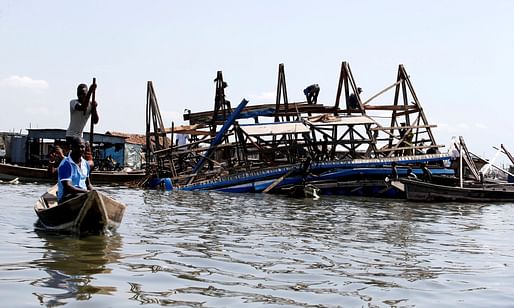

The school collapsed on Tuesday after a heavy rainfall that took over most part of the Lagos including Makoko, a slum and highly populated part of the state [...]
“So as far as that floating school is concerned, it was erected without the permission of the state government.
“The simple answer to the floating school is that it is an illegal structure and it shouldn’t be there.”
— naij.com
Kunlé Adeyemi's floating school was built with the help of the United Nations Development Programme (UNDP) in 2013, to serve 100 elementary school students living in the Makoko slum on Lagos' waterfront. About 300,000 people are estimated to be living in the slum, which before the floating school was built, was going to be demolished due to health concerns. The school had a influential role in convincing the government to instead adopt a "regeneration plan" for the slum.
From The Guardian:
The school became a symbol of bottom-up development, its designs even adopted by the state ministry of urban development for new house plans. The collapse throws this process into disarray.
Plans to rebuild are reportedly already underway.
Related on Archinect:
5 Comments
build it again even stronger, it is that simple.
Or, you know... build correctly the first time.
I wonder what happened? Not draining properly leading to lots of addl water-weight maybe?
My speculation would be similar archanonymous- that water somehow created an imbalance between one set of barrels versus others and the structure twisted apart as a result.
The problem is that you can never build the structure correctly if "the government" doesn't want it to be built in the first place. So the question remains how can you make a non-conforming structure more resilient despite approval?
if you going to build it illegally, at least do it right. buid again. maybe get one of those Dutch houseboat builders to make it. they make those out of concrete i think and I am sure they are to Dutch code. have them float it down from Holland or something, little fund raising trip.
In situations like this where resources are scarce, the engineering becomes even more important. One can't overbuild if you are short on resources to begin with, so advanced design becomes more important... seems like architects interested in helping people through architecture could spend more time fostering knowledge and training in local populations rather than building to gratify their fragile egos...
Block this user
Are you sure you want to block this user and hide all related comments throughout the site?
Archinect
This is your first comment on Archinect. Your comment will be visible once approved.